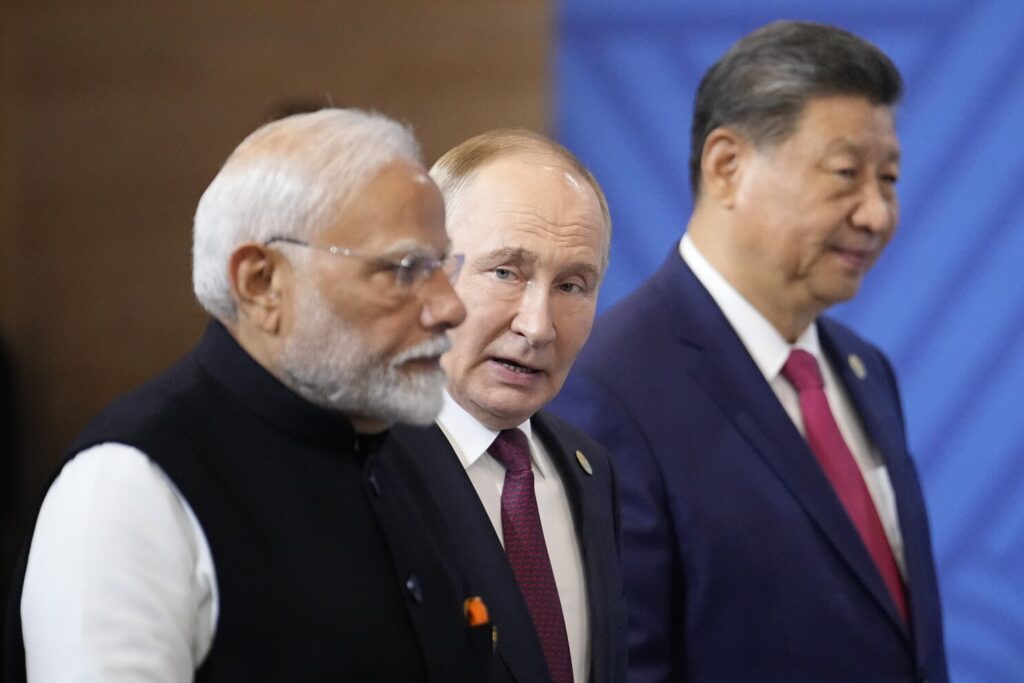
In a significant development from Tianjin, Russian President Vladimir Putin has once again underlined the importance of BRICS Summit at a time when the grouping has taken center stage in global geopolitics. His remarks, delivered in an interview to a Chinese state media agency, signal Russia’s intention to cement summit as a viable, non-Western platform to counterbalance Western-dominated global structures.
This statement comes just hours before Putin’s highly anticipated bilateral meeting with Indian Prime Minister Narendra Modi, adding further weight to the moment. Putin emphasized that Moscow and Beijing remain united in strengthening the Summit grouping to address pressing global challenges—from opposing discriminatory sanctions to championing the socioeconomic development of member nations.
A Strategic BRICS Summit Reaffirmation
For Putin, BRICS is more than just a five-nation economic bloc; it is a powerful assertion that Russia is not isolated on the world stage despite unprecedented Western sanctions. With China as a strategic partner and India playing an increasingly independent role in global affairs, the Russian leader is betting on BRICS to evolve into a formidable platform that rivals Western frameworks like the G7.
“BRICS is not just a dialogue forum—it is a foundation for building a fairer, multipolar world,” Putin reportedly stressed in the interview. The timing of this statement could not have been more deliberate, given Washington’s ongoing attempts to isolate Russia diplomatically and economically.
Modi-Putin Bilateral: A Meeting to Watch
Adding to the significance of Putin’s comments is his planned bilateral meeting with Prime Minister Modi. The two leaders, who share a long history of strategic cooperation, are expected to discuss not only BRICS but also a host of regional and global issues.
The Indian position is especially delicate. On one hand, New Delhi continues to deepen its partnerships with the United States and other Western allies. On the other, India remains committed to maintaining strong ties with Moscow—a partner it cannot ignore in terms of defense cooperation, energy supplies, and its shared vision of a multipolar world.
India’s approach to BRICS highlights its desire for strategic autonomy. As Washington expresses concern over New Delhi’s close engagement with Russia and China, India insists on pursuing an independent course that serves its national interest. This balancing act is at the heart of the Modi-Putin bilateral, making it one of the most closely watched meetings of the summit.
The Ukraine Factor
While BRICS was the central theme of Putin’s interview, the shadow of the Ukraine conflict looms large. Just yesterday, Ukrainian President Volodymyr Zelensky spoke directly to Prime Minister Modi, reportedly requesting India’s help in delivering signals to Moscow. This outreach highlights New Delhi’s growing diplomatic clout as one of the few nations that maintains open channels with both Russia and the West.
However, despite repeated attempts, no bilateral talks have yet taken place between Kyiv and Moscow. The absence of a U.S.-Russia-Ukraine trilateral dialogue further underscores the fractured state of global diplomacy. In this vacuum, India finds itself in a unique position, courted by all sides yet firmly charting its own course.
Washington’s Discomfort
One cannot overlook the ripple effect Putin’s remarks will have in Washington. The United States has long viewed BRICS with suspicion, particularly under former President Donald Trump, who repeatedly described the grouping as “anti-Western” and a vehicle for de-dollarization.
Trump’s rhetoric—often amplified during his election campaigns—portrayed BRICS as a direct challenge to U.S. economic dominance. And while President Joe Biden’s administration has adopted a more nuanced tone, Washington remains wary of any platform that unites Beijing, Moscow, and New Delhi under one umbrella.
By reaffirming BRICS as a “non-Western alternative” to the U.S.-led order, Putin is sending a clear message: Russia is far from isolated and, in fact, sits at the center of a bloc that represents a significant share of global GDP and population.
The Optics of Tianjin
Beyond the policy implications, the optics in Tianjin are powerful. The coming together of Putin, Modi, and Chinese President Xi Jinping is bound to make headlines across the globe. For Beijing, hosting these leaders under the BRICS banner serves as a symbolic counterpoint to Western-led summits.
Economically, BRICS nations today account for a substantial portion of global growth, trade, and investment. Collectively, they rival—if not yet surpass—the combined weight of the United States and Europe. With its recent expansion to include additional members, BRICS is positioning itself as a true fulcrum of the global economy.
A Multipolar Future?
The unfolding events in Tianjin mark more than just a summit—they represent a shift in the narrative of global politics. For Russia, BRICS is proof of its enduring relevance. For India, it is a tool to balance great power rivalries while safeguarding its autonomy. For China, it is an avenue to expand its influence beyond its immediate neighborhood.
What remains to be seen is whether BRICS can move beyond symbolic gestures to deliver concrete outcomes. The talk of de-dollarization, alternative payment systems, and collective economic projects has been circulating for years. Now, with Western sanctions accelerating global polarization, the pressure is on BRICS leaders to transform ambition into action.
As the Modi-Putin bilateral unfolds, and as Xi joins the conversation, the world will be watching closely. For Washington, the message from Tianjin is unmistakable: the age of a unipolar world order is fading, and BRICS is emerging as a bold, alternative force.






